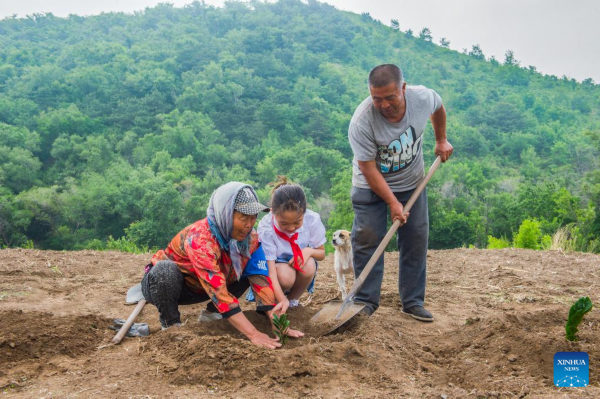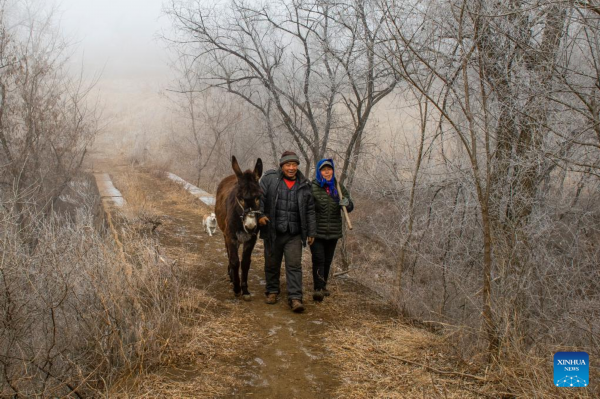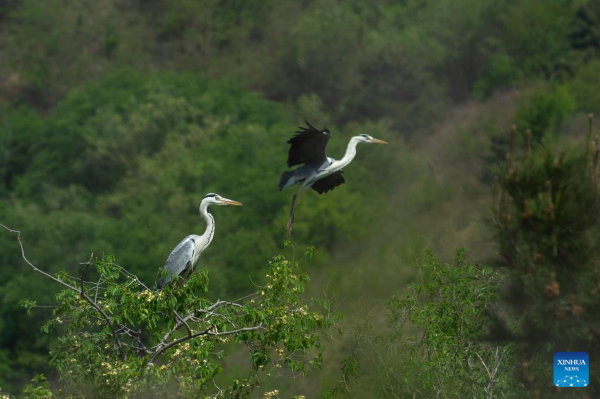
People view and take pictures of egrets and herons at "Lu Ling," which in Chinese refers to the mountain that herons inhabit, in Linghai of Jinzhou City, northeast China's Liaoning Province, April 30, 2022. In northeastern China's Liaoning Province, a peasant couple spent nearly half a century magically transforming two barren mountains into a leafy paradise for birds, creating an epic tale with their bare hands. (Xinhua)
SHENYANG, March 12 (Xinhua) -- In northeastern China's Liaoning Province, a peasant couple spent nearly half a century magically transforming two barren mountains into a leafy paradise for birds, creating an epic tale with their bare hands.
Tian Wangui, 67, and his 63-year-old wife Lu Min, are villagers in Qiantian Village, Cuiyan Township under Jinzhou City. After finishing his service in the army in the 1980s, Tian returned home and conceived of a new livelihood -- planting fruit trees on the hills at his doorstep.
With the support of his wife Lu, in 1982, the couple spent their savings to acquire the contract rights of two mountains. "There was nothing on the mountains back then," recalled Tian, who described the hills as "desolate."
At first, the couple planted some fruit seedlings on part of the land. In order to water the saplings, they had to carry water up to the top of the mountain several times a day by themselves.
The land suitable for fruit tree planting was limited. Looking at the "lonely" saplings, the couple came up with a new idea -- to plant more trees to keep the fruit trees company.
When spring came, they went to the nearby forest farm to buy a pile of tree seeds, no matter what kind, and sprinkled them on the mountains.
Extensive planting methods didn't make things go smoothly at the start. Many seeds failed to take root on the mountain because they didn't adapt to the soil. But the two farmers didn't give up. They repeated the same work every year, and finally ushered in a turning point.
After numerous attempts, they found that several kinds of trees, including acacia, elm, pine, and mulberry, were tough enough to survive the barren mountains. They then specifically bought the seeds of these species, which greatly improved the success rate of planting.
Year after year, the couple poured countless earnings into tree planting, including the proceeds from selling fruit. "It has been so long, and we have spent too much that I have lost count," Tian said. "But it was all worth it to witness the mountains turning green."
Now, two mountains are covered by more than 50,000 trees of over 20 species. The metamorphosis has also won the favor of rare birds.
Around the spring of 2000, some unexpected visitors arrived for the first time at Tian and Lu's mountains. Based on their color and facial features, the couple recognized them as egrets and herons, both second-class protected wild animals in China.
Rare birds such as egrets and herons have long been "environmental monitors" because of their high-level demands of habitat. Now, more than 2,000 rare birds inhabit the mountains every year.
The reason why birds fly over is the grown trees and the improving environment, the couple said. Their mountains have also become popular destinations for shutterbugs.
In 2009, the local government began to build a reservoir on the outskirts of Jinzhou City to ensure the city's water supply and prevent floods. Tian and Lu's village is at the core of the reservoir construction area. The mountains, which the couple has spent nearly half a century preserving, coincide with the government's efforts to improve the ecological environment.
Since around 2010, the local government has been providing policy support and financial subsidies to the couple, in order to express gratitude for their lifelong efforts and encourage other locals to take part in the construction of a superior environment.
Today, the forest coverage of Jinzhou City has reached 18.1 percent, according to official data. A total of 336 species of wild birds have been found in the city, including nine species under national first-class protection and 51 species under national second-class protection.
Last year, Tian and Lu's mountains have been given the name "Lu Ling," which in Chinese refers to the mountain that herons inhabit. The careers of the couple have also changed, from planting trees to patrolling mountains.
"We cherished the mountains and trees as we cherish our own child," said Lu, "Even as we grow old, our children will continue to guard the woods, watch over the birds and keep our dream alive." ■

Tian Wangui (R) and his wife Lu Min (L) help a girl plant a tree at "Lu Ling," which in Chinese refers to the mountain that herons inhabit, in Linghai of Jinzhou City, northeast China's Liaoning Province, June 3, 2022. In northeastern China's Liaoning Province, a peasant couple spent nearly half a century magically transforming two barren mountains into a leafy paradise for birds, creating an epic tale with their bare hands. (Xinhua)

Tian Wangui (L) and his wife Lu Min (R) patrol over "Lu Ling," which in Chinese refers to the mountain that herons inhabit, in Linghai of Jinzhou City, northeast China's Liaoning Province, Feb. 10, 2023. In northeastern China's Liaoning Province, a peasant couple spent nearly half a century magically transforming two barren mountains into a leafy paradise for birds, creating an epic tale with their bare hands. (Xinhua)

Herons are pictured at "Lu Ling," which in Chinese refers to the mountain that herons inhabit, in Linghai of Jinzhou City, northeast China's Liaoning Province, May 4, 2022. In northeastern China's Liaoning Province, a peasant couple spent nearly half a century magically transforming two barren mountains into a leafy paradise for birds, creating an epic tale with their bare hands. (Xinhua)





